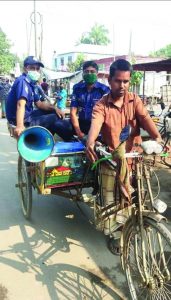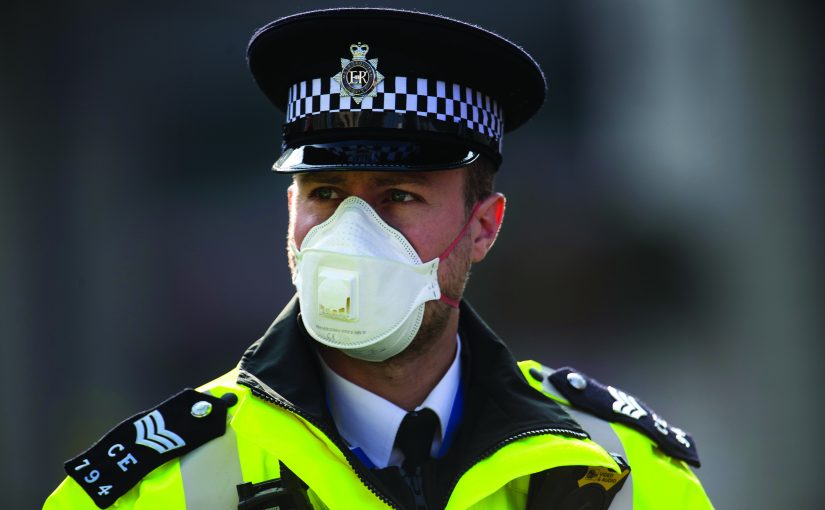Security institutions like the police have been at the center stage of the health-related crisis brought by the spread of Covid-19. This situation placed the police staff second only to the health workers as important agents of the state to render services for mitigating crisis amid high levels of fear and insecurity in the society. To ensure the survival, health, and safety of people during this crisis, usually held public liberties and freedom of movement were restricted. The police forces, which are entrusted to ensure these liberties, were pressed to prioritize restrictions and controls, challenging their typical job orientation. The patterns of practice have varied from state to state, depending upon the particular social, economic and governance context of each country and the varying degrees of the risks involved through the spread of the Covid-19 virus. The security sectors across continents from Europe to Asia, the Americas, Oceania, and Africa have not just been busy catching the criminals or managing the traffic, rather they have also been working to impose movement restrictions; help the health staff in contact tracing; protect the vulnerable health and essential services staff from attacks and abuse; ensure free flows of essential supplies; catch hoarders, black marketers, and cyber fraudsters who had been taking advantage of vulnerabilities of restricted social spaces under which people have been forced to live and even help in laying the dead to rest with dignity, when no one else claims the bodies of those who have died from the virus.
The pattern of police service delivery seems to be emerging as a balance between public order and control on one hand and welfare and multi sector partnerships with health and municipal governance on the other. In some cases, as the security sector became more vulnerable to the risk of exposure and police officers were dying in the line of duty due to the coronavirus, the dedication and service of the police and security sector was increasingly appreciated by the public. However, in places where police were not able to appropriately handle these situations and responded to the lockdowns and other similar situations through the use of violence, agencies have fallen under severe criticism, with the public questioning not only the police tactics—but the state’s authority to deploy these measures. There is a clear expectation from f the police and security sector in this pandemic that goes beyond their usual mandate.
The police, who are often criticized for not having a multiagency approach, now seem to be working in an organized manner with such sectors of the state like the health sector and the municipal sector. This acknowledgement of the police’s role is close to the concept of human security, which recognizes that, in addition to responding to the security needs of interpersonal violence and providing physical safety from aggressive behavior of others, public safety involves addressing security needs arising out of insecurities related to the environment, spread of disease, climate change, and other experiences of insecurity in life that are not caused by physical violence.1 This concept, which highlights a wider role of security sector, goes beyond physical violence to cover all aspects of human insecurities.2 The threats to security are also related to the recognition of the person-centered attention to the intersections of multiple dimensions of life, requiring a coordinated approach through partnering with other agencies and members of the communities the police serve.3
As the police advanced in their role in the management of the pandemic at various levels, the role orientation begins to stand very close to another international norm set through the United Nations (UN), the Sustainable Development Goal 16, which has a mandate to promote peaceful and inclusive societies for sustainable development by providing access to justice for all without regard to social and economic privileges and to build effective, accountable, and inclusive institutions at all levels.4 Linking security and justice to the development of strong institutions that holistically consider human security aspects in government practices recognizes that the vulnerability of people to various kinds of insecurities and hazards should be seen from a comprehensive multidimensional perspective.5 These norms create a standard for multisector efforts of regulation of public life and security and facilitation of people’s welfare, forming a framework within which the police are expected to provide their services.
Human Security and the Police
Human security is a new concept that emerged from the theories of human development. Designed to address police and security sector reforms primarily in developing countries, this concept provides a holistic understanding of the roles of security institutions in pandemic management in an all-country context, as all the countries of the world have faced a shared health-related vulnerability, irrespective of their development category.
The concept of human security was envisioned by Noble Laureate economist Amartya Sen and the UN Secretary General Kofi Annan, among many other thinkers and global policy leaders, in 1994. By the first decade of the present century this approach was soon adopted by countries like Canada, Japan, and Norway, which were later joined by many other countries, to address the needs of security in the developing world. Human security expands the concept of national security by bringing together the “human elements” of security, rights, and development.

All six elements of human security are in some way related to freedom from fear and freedom from want. These elements are economic security, food security, environmental security, health security, personal security, and community security. The health security element is the driver of all of the other insecurities in the case of a pandemic, the fear of contracting the virus, the stigma attached to it, the abandoning of the sick and dead people, the fear of the disease spreading, and all other comprehensive aspects of the pandemic. Closely related are environmental security and food security, as parts of freedom from want, as all public spaces become vulnerable to infections and as fears of food-related riots and public dissatisfaction in the access to essential commodities amid persistent lockdowns gave rise to problems of public reactions and backlash at security forces and health staff. The personal security and community security elements, with which the police are more familiar, have started throwing newer challenges worldwide as the human dimension of insecurity gets accentuated by increased instances of domestic violence and gender-based violence. Child abuse and elder abuse also increased as victims remained restricted to abusive homes and buildings. The increase in the use of drugs and intoxicants inside abusive homes further increased victims’ vulnerability. Among these newer challenges for the police are also the increase in newer kinds of crime via the internet such as cyber bullying through social media, cyber attacks, and cyber-enabled fraud. Intercommunity mistrust has grown with the pandemic, with individuals and communities holding increasing prejudices linked to intercommunity doubts about ethnicity, lifestyles, living habits, food habits, and religious and cultural practices. This mistrust leaves a greater potential for intercommunity clashes, racial and ethnic violence, and related vulnerabilities. All of these human security needs result in a heightened demand on police services, time, energy, and skills. This situation doesn’t just require greater capacity building and risk resilience efforts but also highlights the need to have national, regional, and local strategies for police resource mobilization and scaling up of police capacity.
The SDG16 and the Role of the Police
The Sustainable Development Goal 16 was introduced in 2015, and it has been adopted as a guiding principle by the UN and all its member countries. It requires member countries to take a focused approach in building effective and inclusive security and justice institutions. This involves the strengthening of state institutions like the police services to incorporate citizen welfare and the holistic good of the community. This context of policing in which the multidimensional fears and vulnerabilities of the people are addressed from a security and justice perspective brings police and law enforcement inside the development and welfare context.6 These efforts need to be acknowledged as important policy considerations for a holistic inclusion of the role of police in welfare administration and citizen-centric governance. The pandemic crisis and the evolving role of the police in providing security to the public in a health-related emergency have given enough evidence that these aspects of police and welfare of the public are relevant in countries across the world.
Faced with the management of the pandemic, the role of the security sector, especially the police has been uniquely affected, altering the focus and orientation of its service delivery and ethics of its practice and demanding almost daily shifts in strategies, methodologies, and policing priorities. There is an urgent need to address policy requirements to improve police capacity. The inspirations from existing visions and normative standards must be drawn to work on state capacity to respond to the present and future global crises. Using the concept of human security and the goal of SDG16 to address policy needs is relevant and feasible, as almost all nations of the world endorse these internationally held principles through formal agreements. It is now necessary to extend their relevance to inform policies in police capacity building in all countries, as vulnerabilities due to the pandemic have created similar policing needs across the globe. There is an urgent need for policy deliberation on the role of governance institutions, particularly the police, a situation that underscores a longer and perhaps a permanent organizational development concern with a direct bearing on the state capacity.
Notes:
1Des Gasper and Oscar A. Gómez, “Human Security Thinking in Practice: ‘Personal Security,’ ‘Citizen Security,’ and Comprehensive Mappings,” Contemporary Politics 21, no. 1 (2015): 100–116.
2Amartya Sen, “Why Human Security?” (presentation, International Symposium on Human Security, Tokyo, Japan, July 28, 2000).
3DesGasper, “Securing Humanity: Situating ‘Human Security’ as Concept and Discourse,” Journal of Human Development6, no. 2 (2005): 221–245.
4UnitedNations (UN), Department of Economic and Social Affairs, “Sustainable Development Goal 16.”
5UN, Transforming Our World: The 2030 Agenda for Sustainable Development (2015).
6Jarrett Blaustein et al., “Criminology and the UN Sustainable Development Goals: The Need for Support and Critique,” British Journal of Criminology 58, no. 4 (July 2018): 767–786.
Please cite as
Vineet Kapoor, “Human Security and Norm Settings for the Police during the Pandemic, ” Police Chief Online, June 9, 2021.



